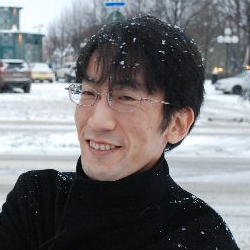Ryu Umemoto Obituary
 |
Also Known As: 梅本竜 (うめもとりゅう) / Minami Ohga / MIZINCO / R.Umemoto |
| Date of Birth: February 18, 1974 (Yokohama) |
|
| Date of Death: August 16, 2011 (Tokyo) |
|
| Game Works: EVE, Xenon, YU-NO, Akai Katana |
|
| Official Site: N/A |
History
| Organisation | Type | Tenure | Role |
| Familysoft | Game Developer | 1992 – 1993 | Composer |
| HimeyaSoft | Game Developer | 1994 – 1995 | Composer |
| RisqueFellow | Music Production | 2004 – 2008 | Co-Founder, Producer, Composer |
| EGG Music | Record Label | 2006 – 2011 | Mastering Engineer |
| Spin Out | Music Production | 2009 – 2011 | Co-Founder, Producer, Composer |
| GE-ON-DAN | Artist Collective | 2009 – 2011 | Member |
| Cave | Game Developer | 2010 – 2011 | Composer |
Biography
Ryu Umemoto is a deceased video game composer known for his work on a range of visual novels and shooters. Umemoto was born on February 18, 1974 in Yokohama to a family who owned a fishing business. A curious and imaginative child, he shined at school for his ability in mathematics and adored the Gundam television series to the point of drawing designs of his own. Growing up during the genesis of video games, Umemoto was introduced to arcade games with 1983’s Elevator Action and soon became a massive fan of them — even going on to win an official contest to beat Salamander the fastest. In his teenage years, he regularly played on the MSX, NES, and PC-8801. It was the sound of early video games, combined with the albums of Yellow Magic Orchestra, that inspired his lifelong love of music. Despite not having any musical training, he soon taught himself how to play synthesizers and drums, going on to form several bands with friends at high school, including the video game-influenced Tailgunner. He also learned how to program using the MSX and PC-8801, starting to design games and write jingles of his own. The artist also developed a long-term fascination with Monet’s painting at art school.
After graduating from high school, Umemoto had an important choice. His family wanted him to join and eventually inherit their fishing business, but he felt he could cultivate his talents and passions — for music, video games, and mathematics — by becoming a video game composer. Umemoto knew he could be successful in this role — he regularly sent demo disks to MSX magazines and soon received requests from small software developers to write their music. However, his choice to enter the video game industry led to an argument with his father and he left home shortly in pursuit of of his dreams. For Umemoto, game music was something deeper than a profession. He believed music and sound were instrumental in the process of connecting the player to the world they were interacting with. In later years, he would develop an appreciation for Zen Buddhism and went on to apply its philosophy to all aspects of his life, one of these being music composition, and he noted that his music always mathematically adds up to a lucky number in Zen in some way or another. One of his main reasons for creating music was to express his culture and spirit across the world, and in turn he hoped others would do the same and create their own music.
After making his debut on the doujin game Hibiki, Umemoto accepted a position at developer Familysoft during 1992. During his time at the company, he scored anime-to-game adaptations based on the Gundam, Macross, and Gatchaman universes, and relished the opportunity to convey the sounds of some of his favourite animes using both the streaming technology of the FM-Towns and the YM2203 sound chip of the PC-9801. Being passionate about Gundam since his childhood, the opportunity to score Mobile Suit Gundam: Hyper Classic Operation was especially special to him, though he admittedly found the strict deadlines and specifications frustrating. Fortunately, he found scoring novel intellectual properties more creatively fulfilling, given they enabled him to express his personality more. In particular, he demonstrated his capacity to create compelling action pieces on the military shooters Square Resort and Azure, between creating a richer accompaniment to RPG Wartorn Versnag. Such roles were essential for establishing Umemoto’s ability and versatility as a composer. However, he felt considerably restricted as a resident employee at Familysoft — his projects were assigned to him and his supervisors rarely shared his artistic vision.
Desiring more freedom, Umemoto decided to freelance in 1993. In initial roles, he explored his personality while creating the light-hearted pop-flavoured scores for Princess Maker 2, Dengeki Division, and Mahou Shoujo Fancy Coco. Soon enough, he landed a contract to create a trilogy of eroge visual novels for HimeyaSoft label C’s Ware, Xenon, Desire, and EVE Burst Error. It was on these projects that Umemoto became widely recognised for his artistic use of YM2608 and FM sound modulation; inspired by artists such as Yuzo Koshiro and Hiroshi Kawaguchi, he overcame the limitations of the sound modules to offer enticing and emotional compositions. The deadlines for such titles were often extremely tight — under two months while working on simultaneous projects — but he was given a free reign to compose as he wanted. While working on these projects, he formed a close relationship with producer Hiroyuki Kanno, who shared many of his artistic ideals. He felt particularly strongly about the latter project, given its scenery was often inspired by Yokohama locations and he started to express Zan influences for the first time. In his own words, “Ryu Umemoto was born as a musician” on these titles.
After finishing his contract with C’s Ware, Umemoto was approached by the more prominent bishoujo developer Elf. He created the majority of the score to their most famous title, YU-NO: A Girl Who Chants Love at the Bound of This World. Given the title’s narrative emphasis and static visuals, the music played a central role in communicating the story to gamers; Umemoto brought particular warmth to the game’s characters and settings with his direct but elegant approaches. Like his earlier visual novels, the game was eventually adapted from personal computers to consoles; however, the artist was disappointed that he was not asked to return to adapt them and felt the sound quality of these ports was inferior to their originals. Shortly after, he was asked to create the music for Exit’s Grounseed and the RPG Dragon Lore 2; while the former was primarily composed by his C’s Ware collaborator Ryu Takami, Umemoto’s melodies for the title and ending screens endeared many that played the game. Despite such heights, Umemoto found scoring expansive, high-profile games such as YU-NO both physically and emotionally exhausting. Looking for love and wanting to focus on his personal life, Umemoto took a long break from music and began to work alongside his father on the family business.
After a refreshing period away, Umemoto was eventually tempted to return to the industry following some tempting offers on some low-budget but creatively appealing indie games. With Clockup’s Eclipse, he explored the new generation of sound production to produce a compelling and imaginative score; his spacey soundscapes and techno rhythms enhanced the science-fiction feel of the game throughout. In contrast, he focused on offering uplifting vocal themes and sentimental acoustic sounds for Ano Machi no Koi no Uta back down on earth. Still embracing the opportunity to collaborate, he formed the unit RisqueFellow alongside Ryu Takami and Daisuke Sawada on this project. They worked together on several other projects, including an album series dedicated to the flash comic series Guillian Rader. Also developing a partnership with Hideki Higuchi, Umemoto scored diverse bishoujo titles including Popotan, Beyond the Ultramarine Sky, Inahonomirai, and, most memorably, R.U.R.U.R. for various developers. In each case, he carefully considered the game’s scenarios while expressing his own musicality and philosophy. While none of these titles received the same attention as YU-NO or EVE, Umemoto found working on them highly satisfying.
At request of Harushisa Tanaka (aka hally), Umemoto became a producer of the video game music download service EGG Music during 2006. In this role, he meticulously remastered numerous classic game soundtracks — for consoles spanning the PC-8801, PC-9801, MSX, X68000, SNES, and PC — from their original sources. In many cases, he was required to reverse engineer the consoles and extract the music through binary, and in others he had to correct outdated and incomplete code. Through this label, he also released his historical works — Eclipse, Desire, Xenon, and EVE Burst Error — on a series of now albums that sold out almost instantly. Through hally, Umemoto started networking with more musicians than ever before and became known as a consistently helpful associate, affectionately nicknamed “big brother”. Through such friendships, he produced remarkable guest contributions to Psyvariar The Mix and the original albums Silver Crescent Moon, Spirit of Stone, and Pichnologic. Also active as a doujin musician, he embraced the Touhou scene relatively early with remixes for several circles. As part of the unit Spin Out, the busy artist went on to hybridise vocal performances with DS-10 synthesizers on the Toystrumental series. Also finding happiness in his personal life, Umemoto married his girlfriend Alissa.
During the final years of his life, Umemoto developed a strong relationship with shooter developer Cave, now run by his old friend Makoto Asada. He first impressed the company with an arrangement for 2009’s DeathSmiles arranged album on behalf of Manabu Namiki. As a founding member of the sound creator’s alliance GE-ON-DAN, the artist’s diverse tributes were featured in several other sell-out arranged albums. He was also entrusted to create the entire remixed score for ESPGaluda II Black Label in an anthemic trance style. Having contributed beyond the already high expectations of producer Asada, Umemoto was given the opportunity to score two brand new intellectual properties for the company: the frenzied shooter Akai Katana and the ninja platformer Nin2-Jump. In both cases, he blended contemporary sounds with traditional Japanese instruments to fit the scenery and enhance the action. Nevertheless, no project was too small for him and he continued to participate in other projects — spanning Touhou tributes like Godmother, to DSi casuals like Puzzle Guruguru Logic, to the hobby game Contrasta — alongside various developers and musicians he had met over the years.
After many years under the radar, Umemoto had finally achieved considerable popularity and was enjoying more international recognition than ever. The composer went on to work on three projects to be released during 2011: a guitar-laced revitalisation for the port Akai Katana Shin, some remixes for the Mushihimesama Cave Festival Ver. 1.5, and a brand new soundtrack for the adventure game Instant Brain. Umemoto also set it upon himself to start bringing Cave’s titles worldwide, starting to learn English in his pursuit to do so, and also began proceedings to set up the trade company Hisui in Sweden. While seemingly at the height of his career, Umemoto fell ill with a respiratory infection just as these titles started to be announced. After spending several months struggling in hospital, losing weight and experiencing insomnia, his life was tragically cut short on August 16, 2011. Umemoto’s death has left behind a devastated wife, while shocking many of his fans and colleagues across the world. Indeed, the loss of such a talented and cooperative individual will leave a major hole in the Japan’s game music circle. Having always expressed his spirit through his creations, part of Ryu Umemoto will nevertheless continue to live on through his music.
References:
– Various Album & Game Credits
– Personal Communication
– VGMdb Discography
– Memorial at Gamasutra
– Interview with Hardcore Gaming 101 (English, November 2010)
© Biography by Chris Greening (September 2011). Last updated on February 2, 2013. Do not republish without formal permission.
Posted on February 2, 2013 by Chris Greening. Last modified on March 21, 2014.














